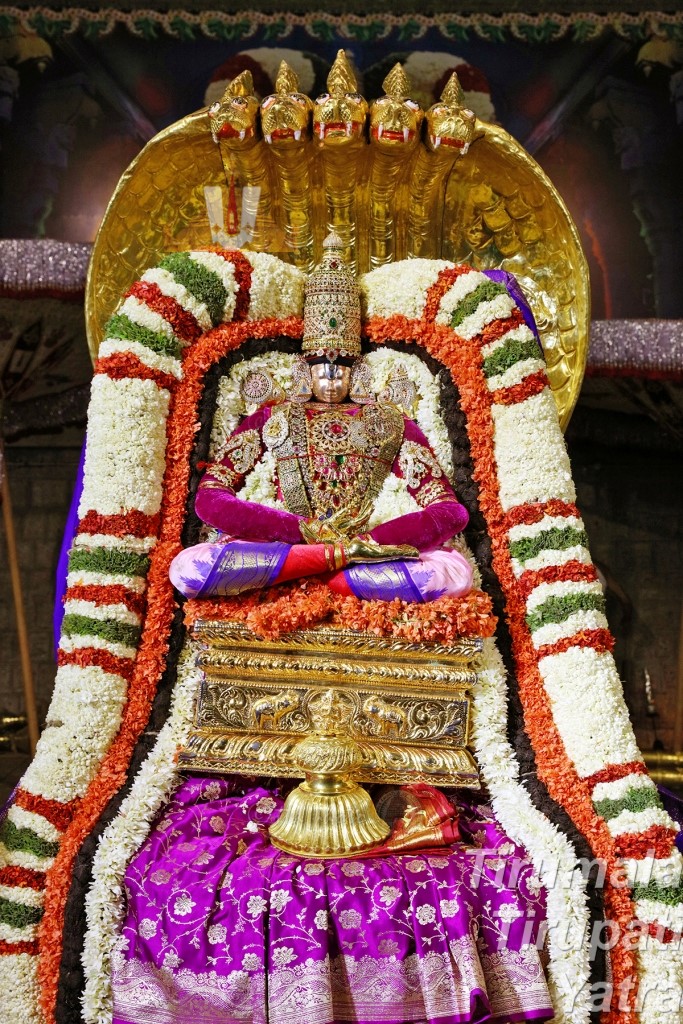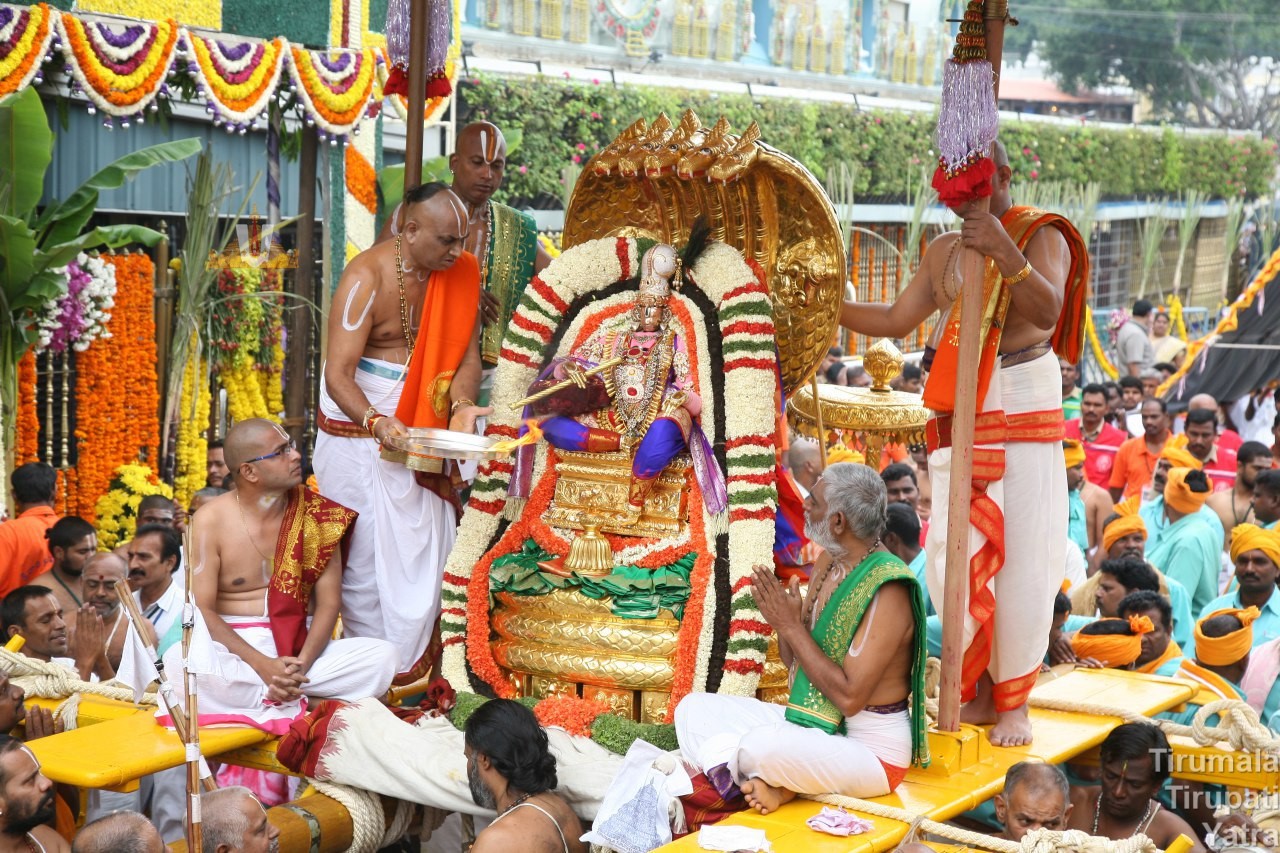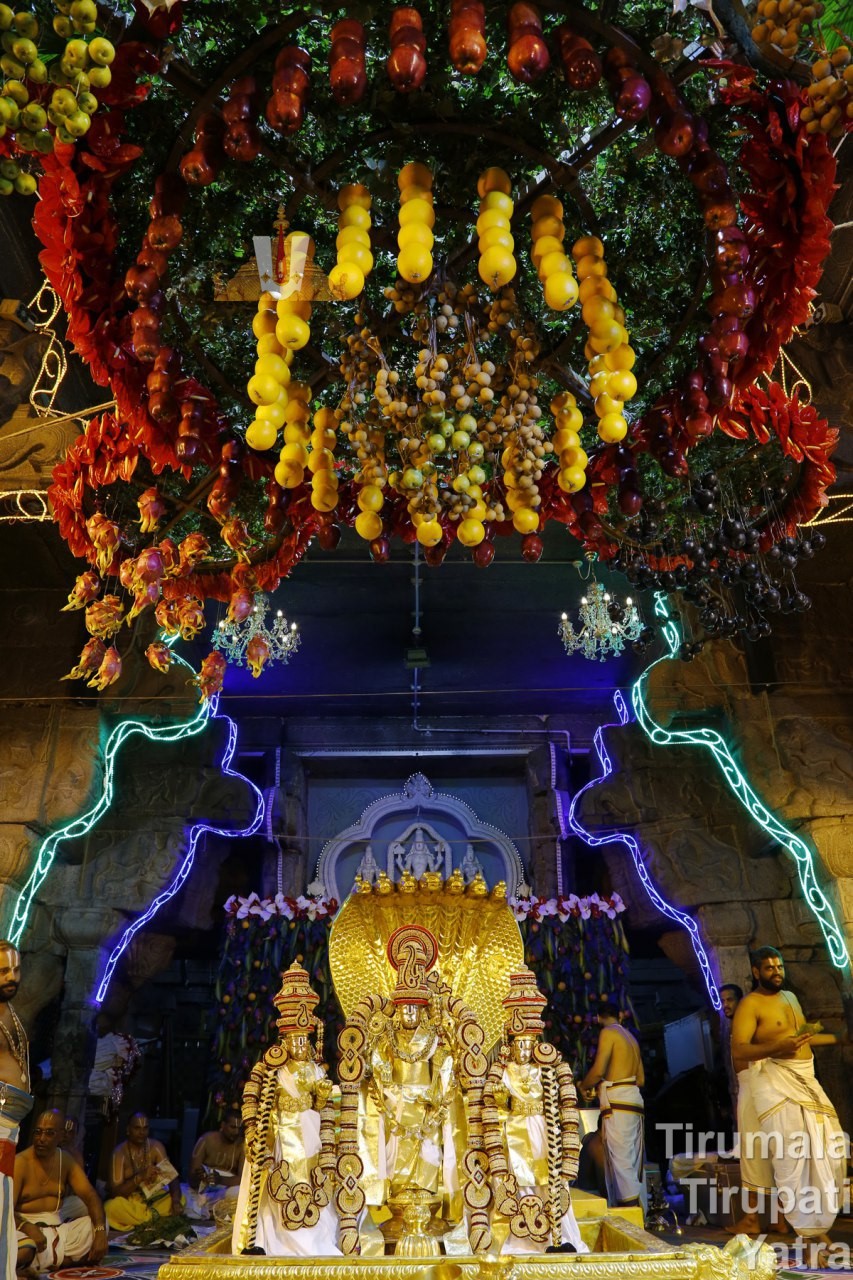Table of Contents
ToggleBrahmotsavams
Once a year, the Brahmotsavams are celebrated to Lord Venkateswara. In the procession, the Lord takes a majestically reclined posture on the various ‘vahanams’ (this page is dedicated to Chinna Sesha Vahanam) offered by the deities. ‘Padakavita Pitamaha’ Annamacharya eulogizes Lord Venkateswara as ‘Tiruveedullo merese Devadevudu,’ and ‘Naanaadikkula Narulella vaanalalone vatturu.’ Lord Brahma initiates the ‘utsavams’ following the command of Lord Venkateswara.
So these ‘utsavs’ are called ‘Salakatla (Annual) Brahmotsavams.’ These ‘utsavams’ will be celebrated for ten days.
Chinna Sesha Vahanam
Venkateswara Swamy who has Seshadri as abode, goes in procession on the second day’s festival, alone on the five-hooded Chinna Seshavahana.
Sesha was born of the spark of Narayana. He is another body of Narayana.
Adisesha is
- the abode,
- the bed,
- the seat,
- the sandals,
- the upper garment,
- the pillow,
- the canopy
that protects him from heat and rain, the forest, the servant, and having a different body, has come under the blessings and protection of God Vishnu, and has come to be praised by people as ‘Sesha.’
Adisesha took the form of a hill as a proper habitation for God Vishnu who wanted to incarnate himself on earth. Such is the affinity between the two. It is because of this that he became a carrier of Vishnu in the Brahmotsava, a second time.
It is on this car that the Lord makes a feast to the eye of the devotees as a flute player.


With tons of flowers
Throughout the ‘utsavam’ on all days, the entire temple, the Mada Veedhis, the Vahana Mandapam, and the Swamy Pushkarini are decorated with tons of flowers and festive lights. The lighting almost transforms night into day the ‘vahanas’ in the night appear much more radiant and dazzling in the dark. Every day the Lord listens to the chanting of the Vedas and Dravida Vedas (Divya Prabhandas) with Tirumalai Kelviappan Pedda Jeeyar and Chinna Jeeyar Swamies at the forefront leading the scholars.
Eminent musicians are brought to play ‘nadhaswaram’, clarinet, drums, and devotees sing and dance in large groups before the Lord expressing their joy. The procession with the Brahma Radham in the front comprises of decked-up elephants, horses, and oxen.
Many groups of devotees register with the TTD to participate in the ‘Srivari Seva’ activities in various capacities. With boundless enthusiasm and devotion, they dance, sing, and chant the holy names of the Lord in his presence. Huge quantities of divine 'prasadams' are offered to the Lord and distributed to the devotees.
The quantities of food items prepared at the Free Annadanam Complex are truly gigantic which is appropriate considering that the Lord of the Seven Hills was described as ‘Ulagam unda peruvayan’ by Nammalwar. Ancient, priceless exotic jewelry and many new additions like diamond crowns are worn by the Lord during the ‘utsavam’.
Snapana Tirumanjanam
Every year during Brahmotsavam, a special Snapana Tirumanjanam will be held at Ranganayakula Mandapam in Tirumala.
The processional deities of Sri Malayappa Swami along with Goddesses Sridevi and Bhudevi will be seated on a special platform and were offered the sacred bath with aromatic ingredients.
As part of this, some special decorations to match the occasion will stand as a special attraction every year. Apart from decorating the stage, colourful flowers, orchids, fruits, creepers, the garlands that were offered to Sri Malayappa Swami remained unique.
The garlands made of Finger Millet (Ragi Mala), Green Pavitras and Coral malas which have also made their maiden way in Snapana Tirumanjanam in addition to Cardomom, Cuscus, Grapes, Tulasi garlands etc.
It is not only the Desi cereals, fruits, flowers, spices that sanctify their lives in the divine service, but also the apples, Grapes, Pears, Mangoes and Cherries that sailed all their way travelling thousands of kilometres from their homelands to bliss their lives in the service of Universal Lord, Sri Venkateswara.

